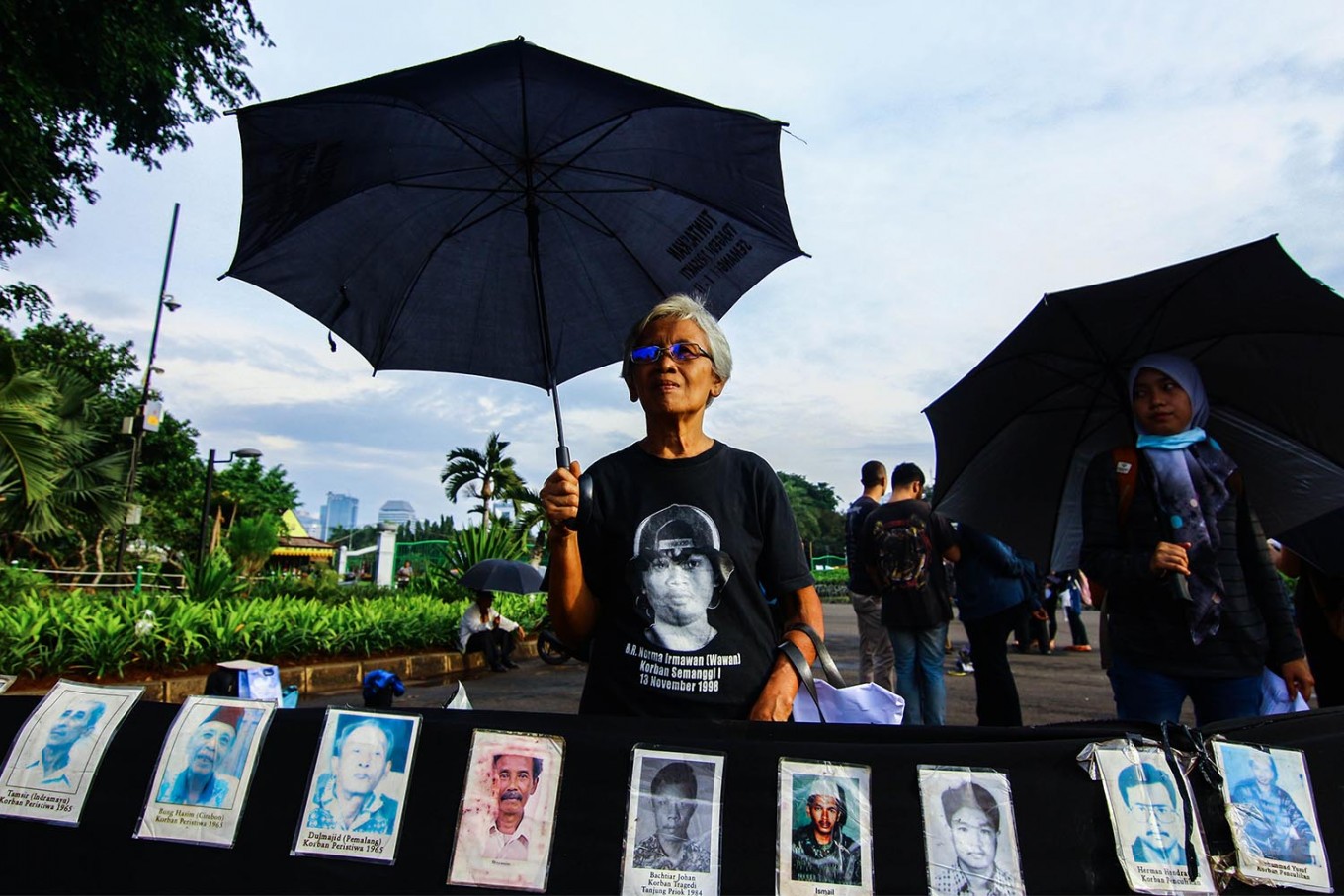Twenty-two years on, families of Semanggi victims grasping at straws in search for justice
Change Size
 Maria Catarina Sumarsih holds an umbrella during the 536th Kamisan, a weekly silent protest in front of the State Palace in Jakarta, on April 26, 2018. The protests have been held since 2007 to urge the government to resolve past cases of human rights abuse, including the 1998 Semanggi shootings that resulted in the death of Maria’s son, Bernardus Realino Norma Irawan. (JP/Aditya Bhagas)
Maria Catarina Sumarsih holds an umbrella during the 536th Kamisan, a weekly silent protest in front of the State Palace in Jakarta, on April 26, 2018. The protests have been held since 2007 to urge the government to resolve past cases of human rights abuse, including the 1998 Semanggi shootings that resulted in the death of Maria’s son, Bernardus Realino Norma Irawan. (JP/Aditya Bhagas)
T
wenty-two years since the 1998 student movement was staged by university students against former Indonesian strongman Soeharto, families of the fallen victims of the Semanggi tragedies are still doing everything they can to search for justice, even as their faith in the government dwindles.
A rare win in a recent lawsuit filed by the victims’ families against Attorney General ST Burhanuddin briefly brought hope to the families that there would be stronger commitment from the government to solve the cases.
The sentiment, however, quickly diminished after the Attorney General’s Office (AGO) filed an appeal against the guilty verdict.
“With the appeal filed, I’d like to ask the AGO and the President, until when? Until when do we have to wait for the President to fulfill his promises? Until when will the AGO uphold the law on human rights courts?” Maria Catarina Sumarsih, one of the victim’s mothers, said on Friday, questioning the commitment of President Joko “Jokowi” Widodo.
Sumarsih’s son, Benardinus “Wawan” Realino Norma Irawan, was among those who died during massive student protests from Nov. 11 to 13, 1998, also known as the Semanggi I tragedy. Since then, Sumarsih has been fighting alongside other victims’ families and activists to seek justice.
Read also: Attorney general files appeal against ruling on statement regarding Semanggi cases
After 22 years, she argued, the government and the AGO had failed to uphold Law No. 26/2000 on human rights courts, which she said was supposedly formed to give hope to the victims’ families.
“The fact that we had to go to the PTUN shows that there is something that needs to be corrected,” Sumarsih said, referring to the Jakarta State Administrative Court, where the recent ruling against the attorney general was made.
The attorney general’s statement that the Semanggi tragedies were not gross human rights violations was a turning point for the government's commitment to revisiting the cases, said a member of the plaintiffs’ legal team, Saleh Al Gifari from the Jakarta Legal Aid Institute (LBH Jakarta).
“The entire landscape of the case investigation was not captured by the [statements of the] attorney general, who only referred to the House meeting in 2001, which in the end makes us believe it is a reflection of his attitude and views on the incidents,” he said.
The investigation process has been stalled at the AGO for years, even though the National Commission on Human Rights (Komnas HAM) has submitted the dossiers of its investigation to the office. Since 2018, Al Gifari said, the AGO had stopped reviewing the case files on the grounds that Komnas HAM had not met the requirements for the case to proceed.
“Why is the attorney general spending energy to fight against victims? Moreover, his materials for the appeal have been answered and judged by the court,” he said.
Fatia Maulidiyanti from the Commission for Missing Persons and Victims of Violence (Kontras) pointed to the irony that the families of the Semanggi victims were seeking justice for human rights abuses in a past authoritarian era, yet the government they were counting on appeared to be reverting to the New Order’s culture of violence and authoritarianism.
“Cases of human rights violations only serve as a vehicle for the current government to gain votes and a good image to show that it is different from previous ones, even though the repressiveness of the system and the recurring patterns of violence still exist,” she said.
She regretted that the Jokowi administration was still allowing several big names who were allegedly involved in the human rights violations to gain political power, while failing to actualize its commitment to international conventions.
The government’s lack of commitment was “a gross betrayal” against the mandate of the law to fulfill the rights of victims, she said, calling for the government to immediately and comprehensively resolve past cases of human rights abuse.
“The presence of [allegedly culpable parties in the government] and the absence of political will to resolve gross human rights cases has put the decades-long struggle of the victims and their families in vain,” she added.
Indonesia should have learned from other countries, especially Argentina, about law enforcement in such cases, Amnesty International Indonesia executive director Usman Hamid said.
After the authoritarian era in Argentina ended, he explained, the new democratic government continued to pursue criminal prosecution of perpetrators of gross human rights abuses, leaving no place for abusers in government posts.
Last year, he said, Argentina’s AGO reported 3,161 cases of past human rights crimes to court, 901 of which resulted in conviction. This year, the office submitted 611 cases, 221 of which have resulted in conviction per October.
“This is of course very different from Indonesia, where zero [people] have been convicted,” Usman said.









